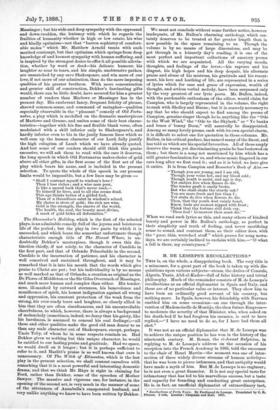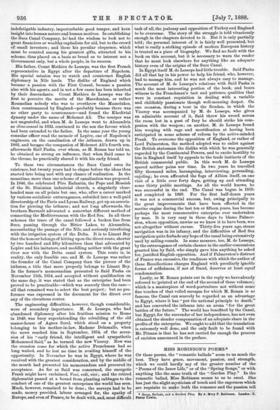M. DE LESSEPS'S RECOLLECTIONS.* Tins is, on the whole, a
disappointing book. The very title is a misnomer, for a great part of the book is taken up with dis- quisitions upon various subjects—steam, the duties of Consuls, Algeria, Tunis, Abd-el-Kader—full of false history and trivial philosophy. Much of the remainder consists of M. de Lesseps's recollections as an official diplomatist in Spain and Italy, and these are of no particular value or interest. They show him to have been an ordinarily good servant of his country, but nothing more. In Spain, however, his friendship with Narvaez enabled him on some occasions—on one through the inter- vention of Mademoiselle de Montijo, the then future Empress— to moderate the severity of that Minister, who, when asked on his death-bed if he had forgiven his enemies, is said to have replied,—" I have no need to do so, for I have had them all shot."
It was not as an official diplomatist that M. de Lesseps was to achieve the unique position he has won in the history of the nineteenth century. M. Renan, the ci-devant Sulpieien, in replying to M. de Lesseps's address on the occasion of his reception into the French Academy in 1885, told the successor to the chair of Henri Martin—the moment was one of inter- section of three widely diverse streams of human activity— that he was born to pierce isthmuses, and that antiquity would have made a myth of him. But M. de Lesseps is no engineer; he is not even a great financier, It is not any special taste for isthmotomy that has led to his marvellous success, but a taste and capacity for founding and conducting great enterprises. He is, in fact, an unofficial diplomatist of extraordinary tact, • Recollections of Forty Years. By Ferdinand de Le:seeps. Translated by 0. B. Pitman. 2 vols. London: Chapman and Hall. 1887. indefatigable industry, imperturbable good temper, and keen insight into human nature and human motives. In establishing the Suez Canal Company, he‘ had the wisdom to look not to great financiers or wealthy capitalists for aid, but to the crowd of- small investors; and these his peculiar eloquence, which must be counted among his greatest gifts, attracted to his scheme, thus placed on a basis so broad as to interest not a Government only, but a whole people, in its success.
His father, Count Mathieu de Lesseps, was the first French representative in Egypt after the departure of Napoleon. His special mission was to watch and counteract English diplomacy in Nile lands. The dislike of England which became a passion with the First consul, became a passion also with his agents, and in not a few cases has been inherited by their descendants. Count Mathieu de Lesseps was the first to perceive the merits of the Macedonian, or rather Roumelian nobody who was to overthrow the Mamelukes, then countenanced by England—probably because there was no other party to countenance—and found the Khedivial dynasty under the name of Mehemet AE. The usurper was not ungrateful, and when M. de Lesseps went to Alexandria as eleve-consul in 1832, continued to the son the favour which had been extended to the father. In the same year the young consular officer read the memoir of Lepere, one of Napoleon's engineers, on the canalisation of the isthmus, drawn up in 1802, and becaine the companion of Mehemet All's fourth son, afterwards Said Pasha, over whom, as M. Refloat has told us, he obtained so strong an influence, that when Said came to the throne, he practically shared it with his early friend.
To these two circumstances the Suez Canal owes its existence, but twenty years had to elapse before the ideas thus started into being met with any chance of realisation. In the meantime, more than one scheme of canalisation was proposed. In 1846, the Celebrated Pere Enfantin, the Pope and Messiah of the St. Sinionian industrial church, a singularly clear- headed man on all points but one, who, after a career marked by various socialistic extravagances, subsided into a well-paid directorship of the Paris and Lyons Railway, got up an associa- tion for piercing the isthmus ; and not long afterwards, the brothers Barra,ult advocated a somewhat different method of connecting the Mediterranean with the Red Sea. In all these schemes the trace of the canal followed a broken line from Suez, passing through the Bitter Lakes, to Alexandria, necessitating the passage of the Nile, and seriously interfering with the irrigation system of the Delta. It is to Linant Bey that the honour belongs of hitting upon the direct route, shorter by two hundred and fifty kilometres than that advocated by Lepere and his imitators, and meddling neither with the great river nor with the Delta canal system. This route is, in reality, the only feasible one, and M. de Lesseps was rather the founder of the Canal Company than the piercer of the isthmus, a title that more properly belongs to Linant Bey. In the former's memorandum presented to Said Pasha on November 15th, 1854, and accepted without qualification on the same day, it was stated that as the enterprise had been proved to be practicable—which was scarcely then the case— all that remained was to select the best project; but no pre- ference was expressed in the document for the direct over any of the circuitous routes.
The engineering difficulties, however, though considerable, were of secondary importance. M. de Lesseps, who had abandoned diplomacy after his fruitless mission to Rome in 1849, was busy superintending the rebuilding of the old manor-house of Agnes Sorel, which stood on a property belonging to his mother-in-law, Madame Delamalle, when the news reached him in September, 1854, of the acces- sion of his "early friend, the intelligent and sympathetic Mohammed Said," as he termed the new Viceroy. Now was the occasion come for which the active Frenchman had so long waited, and he lost no time in availing himself of the opportunity. In November he was in Egypt, where he was received with the greatest consideration, and by the middle of the month had presented his memorandum and procured its acceptance. As far as Said was concerned, the energetic Frank might have exclaimed, Veni, vidi, vici ; and the retired diplomatist passed at a bound from planting cabbages to the conduct of one of the greatest enterprises the world has seen. Much, however, remained to be done ; the surveys had to be made, money provided, labour arranged for, the apathy of Europe, and even of France, to be dealt with, and, most difficult
task of all, the jealousy and opposition of Turkey and England to be overcome. The story of the struggle is told vivaciously enough in the chapters devoted to it. But it is only partially told; the personal interest of it is fairly well presented, but what is really a striking episode of modern European history is treated as a piece of biography. We find no fault with the book on this account, but it is necessary to warn the reader that he must look elsewhere for anything like an adequate history even of the origins of the Suez Canal.
In Egypt itself M. de Lesseps had little trouble. Said Pasha, did all that lay in his power to help his friend, who, however, had to manage him, and he was not always easy to manage. The account of M. de Lesseps's relations with Said Pasha is much the most interesting portion of the book, and bears. witness to the Frenchman's tact and patience, qualities that were in constant requisition in dealing with a variable and childishly passionate though well-meaning despot. On one occasion, during a tour in the Soudan, in which the Viceroy was accompanied by M. de Lesseps, who gives an admirable account of it, Said threw his sword across the room lest in a gust of fury he should strike his com- panion with the weapon; on another, M. de Lesseps found him weeping with rage and mortification at having been anticipated in some scheme of reform by the active-minded Frank. To overcome the opposition of England, or rather of Lord Palmerston, the method adopted was to enlist against the British statesman the dislike with which he was generally regarded by the Continental Powers, and to excite hostility to him in England itself by appeals to the trade instincts of the British commercial public. In this work M. de Lesseps spared neither pains nor time. In two years he travelled fifty thousand miles, haranguing, interviewing, persuading, cajoling; he even affronted the fogs of Albion itself, on one visit of a little over forty days, getting up and attending some thirty public meetings. As all the world knows, he was successful in the end. The Canal was begun in 1859, and completed in 1869. For the first half-dozen years it was not a commercial success, but, owing principally to the great improvements that have been effected in the marine engine during the last ten or fifteen years, has become perhaps the most remunerative enterprise ever undertaken by man It is very easy in these days to blame Palmer- ston, whose opposition, unwise as we know it to have been, was not altogether without excuse. Thirty-five years ago, steam navigation was in its infancy, and the difficulties of Red Sea navigation quite forbade any hope of the canal being extensively used by sailing-vessels. In some measure, too, M. de Lesseps, by the extravagance of certain clauses in the earlier concessions granted him by Said, who simply gave him anything he asked for, justified English opposition. And if Palmerston's distrust of France was excessive, the readiness with which the author of these Recollections charges England with peculiarly ignoble forms of selfishness, if not of fraud, 'deserves at least equal condemnation.
Lastly, as M. Reran points out in the reply we have already referred to (printed at the end of the second of these volumes), which is a masterpiece of word-portraiture not without some fine touches of that veiled sarcm for which M. Reran is so famous, the Canal can scarcely be regarded as an advantage to Egypt, where it has "put the national principle to death," and has converted the isthmus into an arena "for the great battles of the future." The world has benefited by the Canal, but Egypt, for the surrender of her independence, has not even obtained the slender compensation of an adequate share in the profits of the enterprise. We ought to add that the translation is extremely well done, and the only fault to be found with Mr. Pitman is that he has not carried far enough the process. of excision announced in the preface.



































 Previous page
Previous page